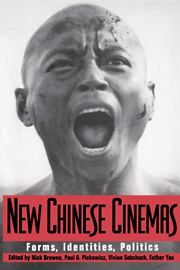Book contents
- Frontmatter
- Contents
- List of Illustrations
- List of Contributors
- Acknowledgments
- Note on the Romanization of Chinese
- Introduction
- I FILM IN THE PEOPLE'S REPUBLIC
- 1 Spatiality and Subjectivity in Xie Jin's Film Melodrama of the New Period
- 2 Society and Subjectivity
- 3 Huang Jianxin and the Notion of Postsocialism
- 4 Neither One Thing nor Another
- II FILM IN TAIWAN AND HONG KONG
- Chronologies
- Glossary
- Scholarly Works on Chinese Filmmaking in the 1980s
- Index
1 - Spatiality and Subjectivity in Xie Jin's Film Melodrama of the New Period
Published online by Cambridge University Press: 05 June 2012
- Frontmatter
- Contents
- List of Illustrations
- List of Contributors
- Acknowledgments
- Note on the Romanization of Chinese
- Introduction
- I FILM IN THE PEOPLE'S REPUBLIC
- 1 Spatiality and Subjectivity in Xie Jin's Film Melodrama of the New Period
- 2 Society and Subjectivity
- 3 Huang Jianxin and the Notion of Postsocialism
- 4 Neither One Thing nor Another
- II FILM IN TAIWAN AND HONG KONG
- Chronologies
- Glossary
- Scholarly Works on Chinese Filmmaking in the 1980s
- Index
Summary
Just as the “new period” is considered a time of transition in Chinese politics, Xie Jin can be regarded as a transitional figure between the classical Chinese cinema and the new wave cinema of the early 1980s. In his filmmaking, Xie Jin draws heavily on the conventions of the Chinese melodramatic tradition, which generally guarantees the popularity of his films. By blending history with fiction or legend, the personal with the political, in a narrative pattern characterized by a bipolar structure that is typically Chinese, Xie Jin's films exhibit a strong social inscription and a sensitivity to the touchy political issues of the time that functioned as the catalyst for his creative activity. The deployment of a well-woven bipolar narrative structure also enables him to establish an almost endless set of contrasts in terms of setting, character traits, and actions that highlight the arbitrariness and absurdity of the ethical-political criteria used by the Party patriarchy to divide people into political insiders and outsiders. This critical edge became a source of inspiration for the younger generation of Chinese filmmakers, including the rebellious Fifth Generation, although the latter went much further than Xie Jin in their film practice and sought to break away from the melodramatic tradition his films embody. Furthermore, although Xie Jin operates within this Chinese melodramatic tradition, his attention to female subjectivity also foreshadows the emergence of women's cinema in China, discussed by Chris Berry.
- Type
- Chapter
- Information
- New Chinese CinemasForms, Identities, Politics, pp. 15 - 39Publisher: Cambridge University PressPrint publication year: 1994
- 3
- Cited by



